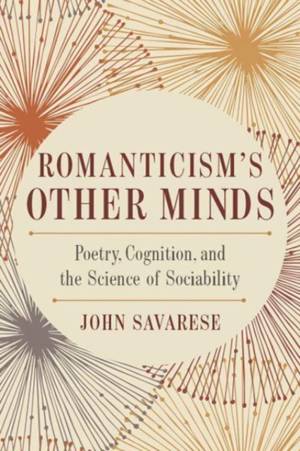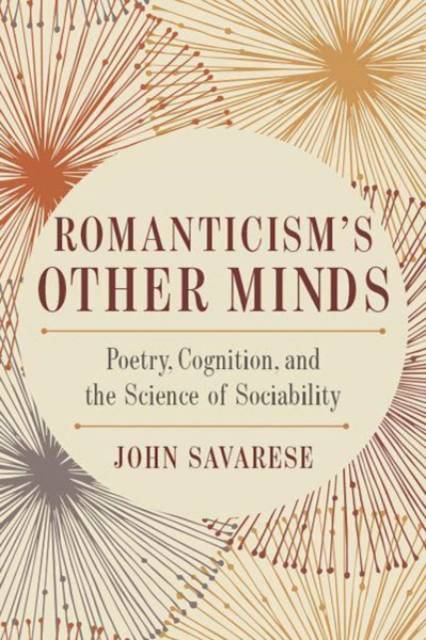
Door een staking bij bpost kan je online bestelling op dit moment iets langer onderweg zijn dan voorzien. Dringend iets nodig? Onze winkels ontvangen jou met open armen!
- Afhalen na 1 uur in een winkel met voorraad
- Gratis thuislevering in België vanaf € 30
- Ruim aanbod met 7 miljoen producten
Door een staking bij bpost kan je online bestelling op dit moment iets langer onderweg zijn dan voorzien. Dringend iets nodig? Onze winkels ontvangen jou met open armen!
- Afhalen na 1 uur in een winkel met voorraad
- Gratis thuislevering in België vanaf € 30
- Ruim aanbod met 7 miljoen producten
Zoeken
€ 67,95
+ 135 punten
Omschrijving
In Romanticism's Other Minds: Poetry, Cognition, and the Science of Sociability, John Savarese reassesses early relationships between Romantic poetry and the sciences, uncovering a prehistory of cognitive approaches to literature and demonstrating earlier engagement of cognitive approaches than has heretofore been examined at length. Eighteenth- and early nineteenth-century writers framed poetry as a window into the mind's original, underlying structures of thought and feeling. While that Romantic argument helped forge a well-known relationship between poetry and introspective or private consciousness, Savarese argues that it also made poetry the staging ground for a more surprising set of debates about the naturally social mind. From James Macpherson's forgeries of ancient Scottish poetry to Wordsworth's and Coleridge's Lyrical Ballads, poets mined traditional literatures and recent scientific conjectures to produce alternate histories of cognition, histories that variously emphasized the impersonal, the intersubjective, and the collective. By bringing together poetics, philosophy of mind, and the physiology of embodied experience--and with major studies of James Macpherson, Anna Letitia Barbauld, William Wordsworth, and Walter Scott--Romanticism's Other Minds recovers the interdisciplinary conversations at the heart of Romantic-era literary theory.
Specificaties
Betrokkenen
- Auteur(s):
- Uitgeverij:
Inhoud
- Aantal bladzijden:
- 220
- Taal:
- Engels
- Reeks:
Eigenschappen
- Productcode (EAN):
- 9780814256053
- Verschijningsdatum:
- 8/10/2023
- Uitvoering:
- Paperback
- Formaat:
- Trade paperback (VS)
- Afmetingen:
- 152 mm x 229 mm
- Gewicht:
- 303 g

Alleen bij Standaard Boekhandel
+ 135 punten op je klantenkaart van Standaard Boekhandel
Beoordelingen
We publiceren alleen reviews die voldoen aan de voorwaarden voor reviews. Bekijk onze voorwaarden voor reviews.











